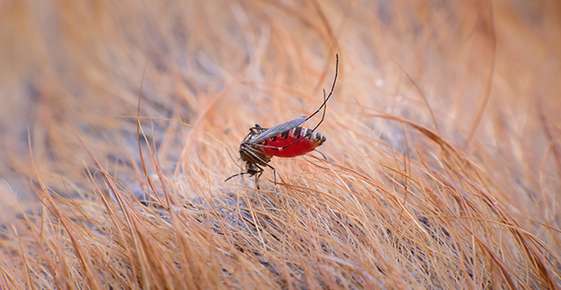Viral Infectious Diseases
Infectious diseases are those that one horse passes to another, or that mosquitoes or other vectors transmit. Some are more common than others. Treatments and prognoses vary, but your veterinarian can help by recommending appropriate vaccinations. Here are some of the more common viral diseases.
Equine Influenza
Horses who inhale infective material can contract equine influenza. Symptoms include a hacking cough, loss of appetite, high fever, nasal discharge, depression and weakness. Just like with human flus, the virus mutates. Flu shots can help protect your horse. Traveling horses should get vaccinated every six months. Veterinarians recommend an annual vaccination for stay-at-home horses. Although equine influenza is seldom fatal, its victims may be left with pneumonia, emphysema or bronchitis.
West Nile Virus (WNV)
This mosquito-borne virus can cause paralysis, convulsions, fever, muscle weakness, impaired vision, compromised coordination, inability to swallow, inflammation of the spinal cord and brain, coma and death. Horses that show clinical signs of West Nile Virus have a 40-percent chance of dying from the disease. Get your horse vaccinated against WNV. If you are traveling to high-risk areas, ask your veterinarian about a booster shot.
Equine Encephalomyelitis (Sleeping Sickness)
Mosquitoes carry several strains of this virus. Ask your veterinarian which vaccinations will best protect horses in your geographical area. At the onset of equine encephalomyelitis, horses become depressed and develop high fevers. Next, comes a period where the horse suddenly seems uncoordinated, shaky and blind. This develops into complete paralysis.
Rabies
Infected animals transmit rabies through saliva. Raccoons, foxes, bats, skunks and coyotes are the likeliest animals to spread rabies. While rabies is not common in horses, it is possible for your horse to become infected. This fatal disease attacks the nervous system. Ask your veterinarian whether he or she advises a rabies vaccination for your horse.
Equine Herpesvirus (EHV) / Rhinopneumonitis
Highly contagious herpes viruses spread through contact with infected horses, contaminated eating utensils and vessels and aerosolized secretions. Types 1 and 4 are the most common forms of equine herpes viruses. EHV4 mostly affects the horse’s breathing. EHV1 additionally causes abortion, paralysis, inflamed spinal cord and sometimes death. Consult your veterinarian about the type and frequency of vaccinations against EHV. As with human herpes, once a horse is a carrier, it is always a carrier.
Equine Infectious Anemia (EIA)
The retrovirus that causes this disease, also known as swamp fever, is similar to HIV in humans. Biting insects transmit EIA from horse to horse. People sometimes transmit the disease from one horse to another via blood transfusions or reusing needles to inject multiple horses. Infected horses may begin to show symptoms after a two- to four-week incubation period. Symptoms include weakness, fever, weight loss, decreased coordination, swelling under the skin and anemia. If the horse survives the acute phase of the disease, it will either become a chronic case or return to being a seemingly normally horse who secretly carries the disease. EIA is rare in the U.S. It is a reportable disease, meaning that any veterinarian who diagnoses it is required to notify the USDA.
Rotavirus
Rotavirus, or foal diarrhea, strikes young horses under 5 months of age. This virus makes foals lactose-intolerant so they are unable to digest their mother’s milk. Horse manure carries rotavirus. Veterinarians prescribe intravenous fluids, nutritional supplements, electrolytes and / or probiotics to reverse this condition of malabsorption and dehydration.
Equine Viral Arteritis (EVA)
Very young or old horses at shows, breeding farms and race tracks are likeliest to catch EVA. Stress also increases horses’ susceptibility. Symptoms include coughing, depression, fever, swelling of the legs and face, increased abortion rates and, sometimes, death.
Given that so many viral diseases can harm your horse, it is crucial to discuss vaccines with your veterinarian. Call us today, and we can advise the best course of action for your horse.

